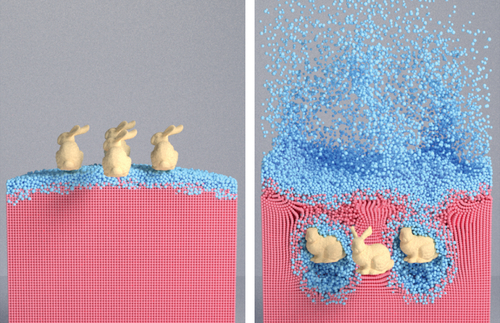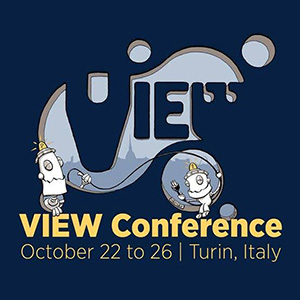-
 Full Conference Pass (FC)
Full Conference Pass (FC)
-
 Full Conference One-Day Pass (1D)
Full Conference One-Day Pass (1D)
Date: Wednesday, December 5th
Time: 2:15pm - 4:00pm
Venue: Hall D5 (5F, D Block)
Session Chair(s): Bo Zhu, Dartmouth College, United States of America
Decoupling Simulation Accuracy from Mesh Quality
Abstract: For a given PDE problem, three main factors affect the accuracy of FEM solutions: basis order, mesh resolution, and mesh element quality. The first two factors are easy to control, while controlling element shape quality is a challenge, with fundamental limitations on what can be achieved. We propose to use p-refinement (increasing element degree) to decouple the approximation error of the finite element method from the domain mesh quality for elliptic PDEs. Our technique produces an accurate solution even on meshes with badly shaped elements, with a slightly higher running time due to the higher cost of high-order elements. We demonstrate that it is able to automatically adapt the basis to badly shaped elements, ensuring an error consistent with high-quality meshing, without any per-mesh parameter tuning. Our construction reduces to traditional fixed-degree FEM methods on high-quality meshes with identical performance. Our construction decreases the burden on meshing algorithms, reducing the need for often expensive mesh optimization and automatically compensates for badly shaped elements, which are present due to boundary constraints or limitations of current meshing methods. By tackling mesh generation and finite element simulation jointly, we obtain a pipeline that is both more efficient and more robust than combinations of existing state of the art meshing and FEM algorithms.
Authors/Presenter(s): Teseo Schneider, NYU Courant Institute, United States of America
Yixin Hu, NYU Courant Institute, United States of America
Jeremie Dumas, nTopology, NYU Courant Institute, United States of America
Xifeng Gao, NYU Courant Institute, United States of America
Daniele Panozzo, NYU Courant Institute, United States of America
Denis Zorin, NYU Courant Institute, United States of America
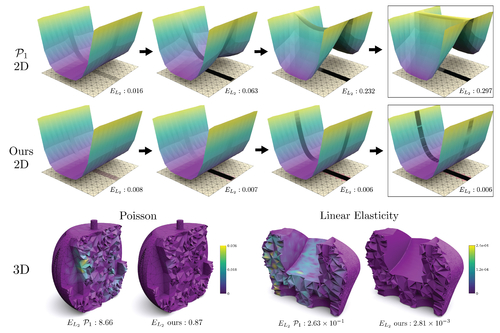
Real-time Viscous Thin Films
Abstract: We propose a novel discrete scheme for simulating viscous thin films at real-time frame rates. Our scheme is based on a new formulation of the gradient flow approach, that leads to a discretization based on local stencils that are easily computable on the GPU. Our approach has physical fidelity, as the total mass is guaranteed to be preserved, an appropriate discrete energy is controlled, and the film height is guaranteed to be non-negative at all times. In addition, and unlike all existing methods for thin films simulation, it is fast enough to allow realtime interaction with the flow, for designing initial conditions and controlling the forces during the simulation.
Authors/Presenter(s): Orestis Vantzos, Technion - Israel Institute of Technology, Israel
Saar Raz, Technion - Israel Institute of Technology, Israel
Mirela Ben-Chen, Technion - Israel Institute of Technology, Israel
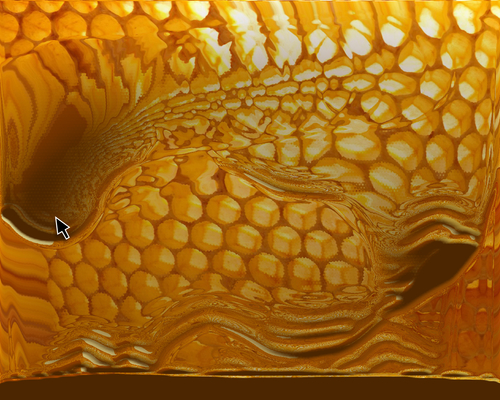
Accurate Dissipative Forces in Optimization Integrators
Abstract: We propose a method for accurately simulating dissipative forces in deformable bodies when using optimization-based integrators. We represent such forces using dissipation functions which may be nonlinear in both positions and velocities, enabling us to model a range of dissipative effects including Coulomb friction, Rayleigh damping, and power-law dissipation. We propose a general method for incorporating dissipative forces into optimization-based time integration schemes, which hitherto have been applied almost exclusively to systems with only conservative forces. To improve accuracy and minimize artificial damping, we provide an optimization-based version of the second-order accurate TR-BDF2 integrator. Finally, we present a method for modifying arbitrary dissipation functions to conserve linear and angular momentum, allowing us to eliminate the artificial angular momentum loss caused by Rayleigh damping.
Authors/Presenter(s): George E. Brown, University of Minnesota, United States of America
Matthew Overby, University of Minnesota, United States of America
Zahra Forootaninia, University of Minnesota, United States of America
Rahul Narain, Indian Institute of Technology Delhi, University of Minnesota, India
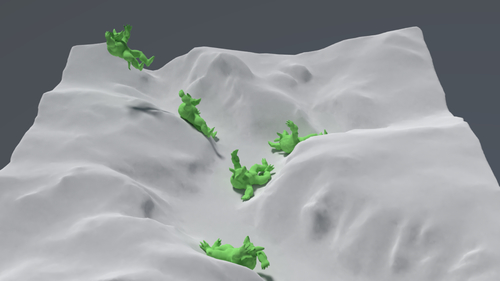
Hybrid Grains: Adaptive Coupling of Discrete and Continuum Simulations of Granular Media
Abstract: We propose a technique to simulate granular materials that exploits the dual strengths of discrete and continuum treatments. Discrete element simulations provide unmatched levels of detail and generality, but prove excessively costly when applied to large scale systems. Continuum approaches are computationally tractable, but limited in applicability due to built-in modeling assumptions; e.g., models suitable for granular flows typically fail to capture clogging, bouncing and ballistic motion. In our hybrid approach, an oracle dynamically partitions the domain into continuum regions where safe, and discrete regions where necessary. The domains overlap along transition zones, where a Lagrangian dynamics mass-splitting coupling principle enforces agreement between the two simulation states. Enrichment and homogenization operations allow the partitions to evolve over time. This approach accurately and efficiently simulates scenarios that previously required an entirely discrete treatment.
Authors/Presenter(s): Yonghao Yue, The University of Tokyo, Japan
Breannan Smith, Columbia University, United States of America
Peter Yichen Chen, Columbia University, United States of America
Maytee Chantharayukhonthorn, MIT, United States of America
Ken Kamrin, MIT, United States of America
Eitan Grinspun, Columbia University, United States of America
